The Sarawak Government is looking into improving the performance management system of the Sarawak civil service (SCS) in accordance with enhanced evaluation criteria in line with the organisation’s performance.
To that end, a sum of RM1.5 million will be allocated in 2024 under the SCS Talent Management System, announced the Premier of Sarawak YAB Datuk Patinggi Tan Sri (Dr) Abang Haji Abdul Rahman Zohari bin Tun Datuk Abang Haji Openg during the Sarawak State Legislative Assembly sitting in November 2023.
The measure is one of several others under the 12th strategic thrust – “Enhancing Government Capacity and Service Delivery” – of the 2024 State Budget; specifically in boosting capacity building of SCS workforce.

“Sarawak Civil Service’s (SCS) workforce plays a pivotal role in ensuring the smooth functioning of government agencies. Their function in providing efficient and quality government services would create trust and confidence among the rakyat towards the Government.
“Reform efforts are being undertaken to build more responsive and effective public civil service so that it is able to deal with the current and future challenges,” the Premier said of the strategic thrust, further outlining its objectives:
- To increase the capacity of Government strategic human resource management and workforce planning;
- To strengthen the recruitment system;
- To strengthen the performance-oriented policies and performance management system; and
- To enhance the well-being of the State Civil Service.
Within an organisation, performance management usually takes place throughout the year. It involves a manager and an employee undertaking a continuing process of communication that might include establishing and determining goals or objectives; making clear of expectations; analysing results; and presenting feedback.
An effective performance management system is vital for an organisation to be able to accomplish its strategic goals. For its employees, they will be able to understand how to perform well in their jobs, and see how their work efforts can contribute to the organisation’s success.

At the same time, through constant engagement with employees, the organisation can eliminate any aspect of work that is deemed irrelevant or identify problems early on in a project or an employee’s work assignment.
This allows the streamlining of its work process and improvement in its efficiency, which can then lead to better use of its resources and a boost in productivity in the long run.
These advantages matter greatly in the public sector. In a report published by the World Bank, the sector is a significant contribution to the national economy and employment, with the general government wage bill accounting for about 10 per cent of global gross domestic product, and the public sector workforce accounting for 36 per cent of formal employment worldwide

For that reason, when it is capable of increasing its productivity, the public sector can guarantee effective service delivery, regulation, infrastructure, law enforcement, and overall government spending.
By boosting its outputs, a high-performing public sector can also help advance the economy and national welfare, saving and utilising finances to address other priorities affecting the country, subsequently enhancing citizens’ trust in the government and vice versa.
However, it is important to note that its performance comes down to not only how money is spent towards socio-economic development, but also the quality and commitment of public servants.

As such, the report states that the performance management system employed by public sector organisations “should focus on both assessing performance and on motivating staff and helping them grow.”
“Whichever performance management model is chosen, the successful achievement of its goals will largely depend not only on individual staff performance, but also on manager engagement and leadership quality,” it adds.
References:
Performance Management in the Public Administration — Seven Success Factors. (2021). EFI Insight-Governance. Washington, DC: World Bank. https://documents1.worldbank.org/curated/en/216271624867473714/pdf/Performance-Management-in-the-Public-Administration-Seven-Success-Factors.pdf
Performance Management: Introduction. (n.d.). University of California, Berkeley. https://hr.berkeley.edu/hr-network/central-guide-managing-hr/managing-hr/managing-successfully/performance-management/introduction
Performance Management: Concepts & Definition. (n.d.). University of California, Berkeley. https://hr.berkeley.edu/hr-network/central-guide-managing-hr/managing-hr/managing-successfully/performance-management/concepts
Sarawak Government. State Legislative Assembly (20 November 2023). Second Meeting of the Second Session, Nineteenth Sarawak State Legislative Assembly Debates. (Hansard). https://duns.sarawak.gov.my/web/subpage/webpage_view/118
Stange, J. (2023, November 21). What is Performance Management? The Ultimate Guide for Building a Strategic Approach. Quantum Workplace. https://www.quantumworkplace.com/future-of-work/performance-management





